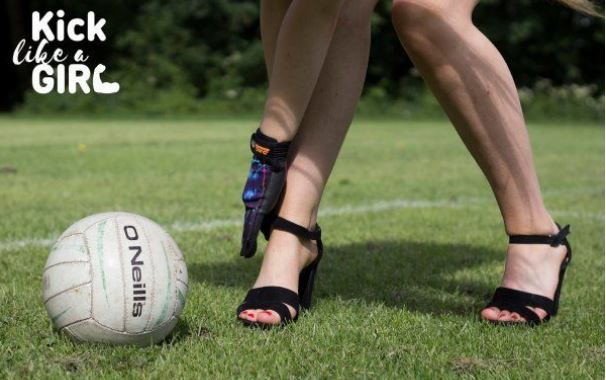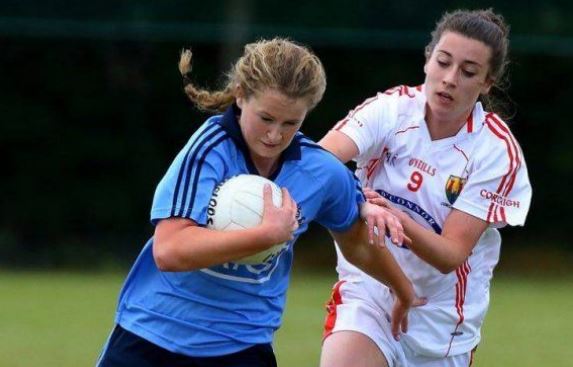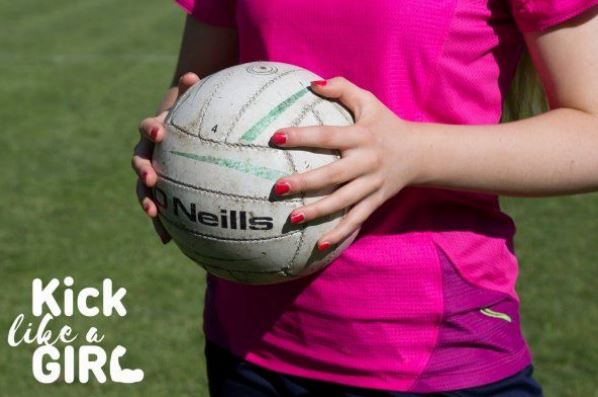
Girls in Gaelic games: These women tell us to Kick Like A Girl
If you or your family have any connection at all with Gaelic Games, you will be all too familiar with the effort, perseverance and stamina that players dedicate to the sport.
Kids in Ireland begin their journey at the local club nursery from the age of four. Soon, drizzly Saturday mornings will be filled with training, friendlies and féiles. As children progress in the sport, it is not difficult to spot the difference between the treatment of male and female players, matches and resources.
The scale of inequalities vary from girls having the same jerseys for years while the boys are often offered new ones, to the sheer gap between crowd followings.
Our girls seem to love the sport as much as our boys do, so how do we combat these issues that could and often do discourage female players from advancing in the sport? Five transition year students from St Joseph’s College might have an answer.

Kick Like a Girl is a social-media based campaign that promotes Ladies Gaelic Games and aims to highlight the inequalities that girls face within the sport.
In September 2016, the five 16-year-olds began their campaign as a Transition Year project, not as players themselves, but as die-hard fans of the boys in blue.
When they discovered the ladies Dublin team, they were confused by the lack of promotion and even awareness of the matches.
They quickly realised that even though many young girls played Gaelic and Camogie, they did not follow the Ladies teams at club or county level. The girls now attended matches for both genders and were shocked at the difference between crowd numbers.
Though it was near impossible to find tickets to last year's all Ireland men’s final, the girls secured tickets to the ladies with ease, even noticing that some schools and clubs were giving them out for free as an incentive to attend.
In surveys they conducted in their all-girls school, Kick Like a Girl discovered that less than half of the girls would rather watch the ladies play over the men. Only 35 students could name female players, while 105 could name male players.
This year ahead of GAA week, the girls organised a panel at their school when they invited players from both the Ladies and the Men’s Dublin teams, to discuss their experiences on this issue. Sinead Goldrick, Lindsey Davy and Paul Flynn were in attendance. Overall it was clear that the women put the same amount of time, effort and sacrifice into the sport, while having nowhere near the amount of supporters as the male players.
The answer, it seems, comes in the form of a solid and expansive following for ladies Gaelic Games.
Kick Like a Girl’s aim over the past year is to develop this fanbase, and ultimately contribute to the equalizing of male and female crowd-following. On their Facebook page, they insist that they will continue their efforts until they “found it difficult to get tickets to a Ladies' All Ireland Final”
We spoke to Sarah McCaffrey, member of the Ladies Dublin Team, to get an idea of how the players feel at County level. Sarah seems to agree with the girls.

“Many of the reasons women play Gaelic games are consistent with why men play. The love of the game, the sense of camaraderie, the unique friendships, the pride of representing your county and community. Both men and women get this out of playing."
"What needs to change in order for the women's game to be seen in the same light as the men's is the attendance at games and the media coverage," she added.
Recently, the Kick Like a Girl project has extended to include visits to local primary schools for Gaelic workshops and coaching.
We asked Emma from the team, if the boys at St Patrick's in Chapelizod (a mixed school), had any issues about being coached by young women in pink Kick-Like-a-Girl T-shirts.
Her answer? Gender does not matter to kids in sport. From this we can see that the level of inequality in any sport is not pre-existing and can be diminished with time and effort such as projects like Kick-Like-a Girl.

It is exciting times as Kick Like a Girl have since been recognised by the LGFA themselves.
They have gained the support of household names from the Dublin men's team such as Johnny Cooper, Duirmead Connelly and Paul Flynn. They have also caught the attention of Minister for Children and Youth Affairs, Katherine Zappone, the Minister for Transport, Tourism and Sport, Shane Ross and the Lord Mayor of Dublin, Brendan Carr.
As the five girls' TY experience comes to a close, they have plans to continue their social media campaign to reach their goal, posting as often as they can with match times, locations and information about ladies teams for both club and county. They have also expressed interest in expanding the project, perhaps organising a Kick Like a Girl Summer camp in Summer 2018.
The girls from St Joseph’s are not the only ones who are ready for a revolution and it appears that there is indeed light at the end of the tunnels of Croke Park.
McCaffery talks of her enthusiasm for being part of Ladies Gaelic games in these changing times as well as the issues they still face.
“It's an exciting time to be involved with ladies Gaelic football," she enthuses. There were over 31,000 in attendance at Last years all Ireland final between Cork and Dublin, making it the highest attended ladies sporting event in Europe that year."
"However, this number still pales in comparison to the men's finals where it would be unheard of for Croke Park not to be at capacity, 82,000.”






